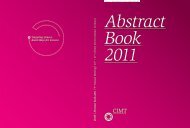Abstract Book 2010 - CIMT Annual Meeting
Abstract Book 2010 - CIMT Annual Meeting
Abstract Book 2010 - CIMT Annual Meeting
You also want an ePaper? Increase the reach of your titles
YUMPU automatically turns print PDFs into web optimized ePapers that Google loves.
036 Wagner | Immune monitoring<br />
GPI-anchor negative T cells with impaired effector function persist<br />
after Alemtuzumab mediated T-cell depletion<br />
Eva Maria Wagner 1 , Aline Naomi Lay 1 , Caroline Goetze 1 , Diana Wolff 1 , Julia Hemmerling 1 ,<br />
Matthias Theobald 1 , Wolfgang Herr 1 , Ralf Georg Meyer 1<br />
1 Department of Hematology/Oncology at the University Medical Center of the Johannes Gutenberg-University<br />
Mainz, Germany<br />
The monoclonal anti-CD52 antibody Alemtuzumab<br />
is frequently used for T-cell depletion (TCD) in the<br />
context of allogeneic hematopoietic stem cell transplantation<br />
(HSCT). We have previously demonstrated<br />
that substantial proportions of reconstituting T<br />
cells remained CD52 negative for years, especially<br />
in patients who did not receive donor lymphocyte<br />
infusions. CD52 is a glycosylphosphatidylinositol<br />
(GPI)-anchored molecule of unknown function. By<br />
flow-cytometry, we demonstrated that the lack of<br />
CD52-expression was associated with decreased<br />
expression of further GPI-anchored molecules like<br />
CD55 and CD59. We therefore analyzed CD52 negative<br />
T cells of 20 patients after HSCT with a fluorescent<br />
aerolysin staining (FLAER) that directly labels<br />
the GPI-anchor and found that the loss of CD52 and<br />
further GPI-anchored proteins in T cells was due to<br />
the loss of the GPI-anchors themselves. In contrast,<br />
CD52 positive T cells of the same patients showed<br />
no reduced FLAIR-signal and normal expression<br />
of CD55 and CD59. Patients who underwent Alemtuzumab-mediated<br />
TCD prior to allogeneic HSCT<br />
suffer from long-lasting immunologic dysfunction<br />
even when peripheral T cell counts have reconstituted<br />
to normal range. Hence, we compared GPI-anchor<br />
positive and negative T cells for their response<br />
to viral and allogeneic stimuli. When FACS-sorted<br />
CD52 negative and positive T cell populations were<br />
expanded in vitro (IL2, OKT3, feeder-cells), we observed<br />
that GPI-anchor expression remained absent<br />
in the CD52 negative T-cell cultures. In contrast, the<br />
CD52 positive T-cell cultures showed constant expression<br />
of GPI-anchors for more than 16 weeks. In<br />
addition, the CD52 expression had no influence on<br />
the growth-kinetics following antigen-independent<br />
stimulation with IL2 and OKT3. However, CD52 positive<br />
T cells showed enhanced proliferation after specific<br />
stimulation with CMV-pp65 peptides. In IFN-γ<br />
ELISPOT assays using CMV-peptide (pp65 and IE-1)<br />
loaded autologous dendritic cells as stimulators,<br />
specific spot production was only detected among<br />
the GPI-anchor positive T cells. To investigate on<br />
T-cell function ex vivo, we performed IFN-γ Secretion-assays<br />
with T cells directly isolated from patients.<br />
CD52 negative T cells again showed a reduced<br />
IFN-γ-secretion after stimulation with either autologous<br />
DCs loaded with the CMV-peptides or with<br />
allogeneic DCs. Nonetheless, T cells with CMV-pp65<br />
specific T cell receptors were present in the CD52<br />
positive as well as the CD52 negative subpopulations,<br />
as proven by tetramer-staining. Despite the<br />
functional differences, the percentages of naïve and<br />
memory T cells did not differ between both populations.<br />
In summary, we demonstrated that after Alemtuzumab-based<br />
TCD, substantial proportions of<br />
reconstituting donor T cells lost the expression of<br />
GPI-anchors. GPI-anchor negative T cells showed<br />
reduced proliferative capacity as well as reduced<br />
IFN-γ secretion in response to CMV or allogeneic<br />
stimulation. Our data suggest that a loss of GPI-anchored<br />
molecules might contribute to an impaired<br />
function of reconstituting donor T cells after Alemtuzumab-mediated<br />
TCD. We will further investigate<br />
on the impact of different GPI-anchored molecules<br />
on effector-functions of different T-cell subsets.<br />
79



